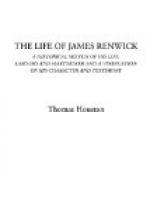The Revolution Settlement, in both its civil and ecclesiastical departments, instead of being the exemplification and carrying forward of the work of the Second Reformation,—for the maintenance of which the Scottish martyrs shed their blood,—was a deliberate abandonment of it, and was established in open opposition to its grand and distinguishing principles. The faithful companions and followers of Renwick refused to incorporate with this Settlement, on the ground of adhering firmly to the scriptural vows of the nation, and the testimonies of illustrious martyrs. While giving the best proof of their genuine patriotism, they withheld allegiance from the government of William, and they took the name and position of “Old Dissenters,” for reasons which they clearly stated, which those who opposed and misrepresented them, were unable to answer, and the greater part of which are as applicable to the present British government, and existing ecclesiastical systems, as they were to the Settlement of the Revolution. Several of the political changes which have taken place in recent times, have supplied strong additional grounds for faithful Covenanters maintaining the position of public protest against, and active dissent from the establishments, civil and ecclesiastical, of the nation. The reasons of separation from the Revolution Church and State, as given by the “Society People,” are presented in a lucid and convincing manner, in the work entitled—“Plain Reasons for Presbyterians dissenting from the Revolution Church in Scotland, as also their Principles concerning Civil Government, and the difference betwixt the Reformation and Revolution Principles.” They are likewise exhibited in a condensed form in the “Short Account of Old Dissenters,” emitted with the sanction of the Reformed Presbytery, and in very luminous terms in the Historical part of the “Testimony of the Reformed Presbyterian Church.”




